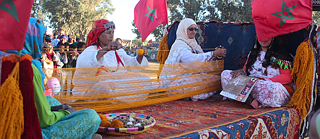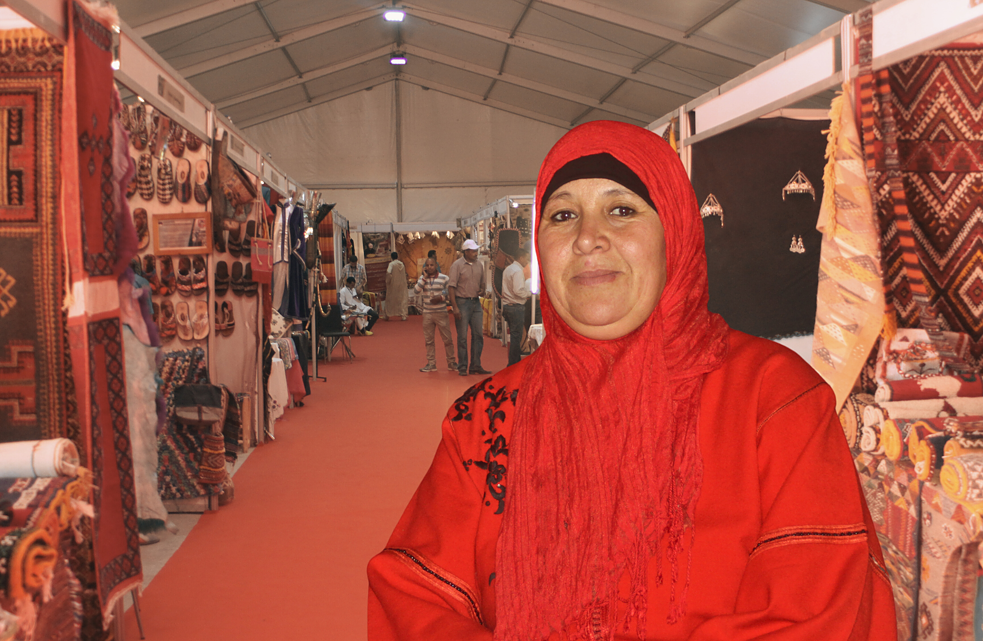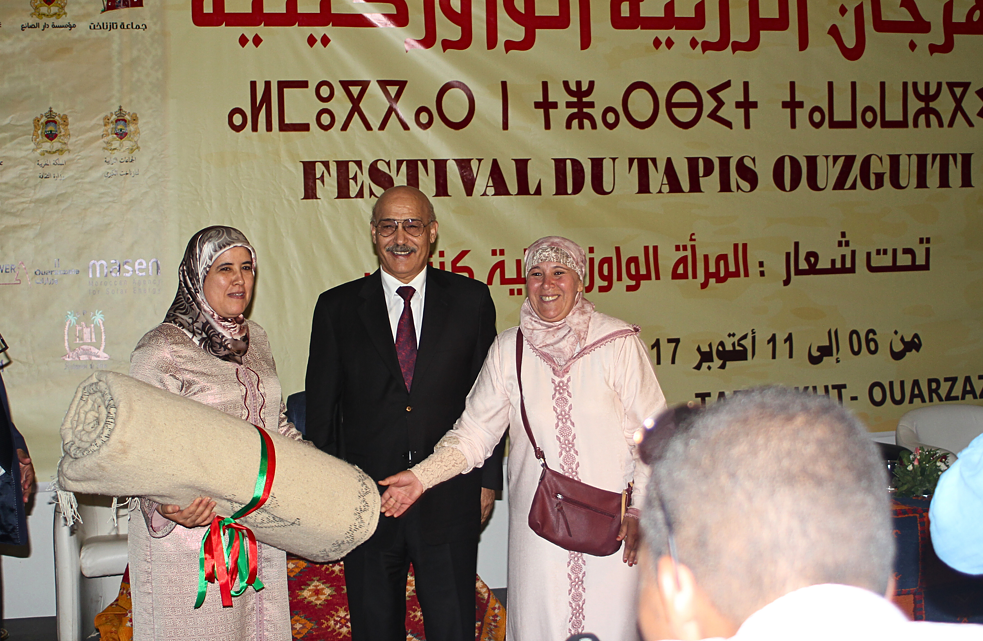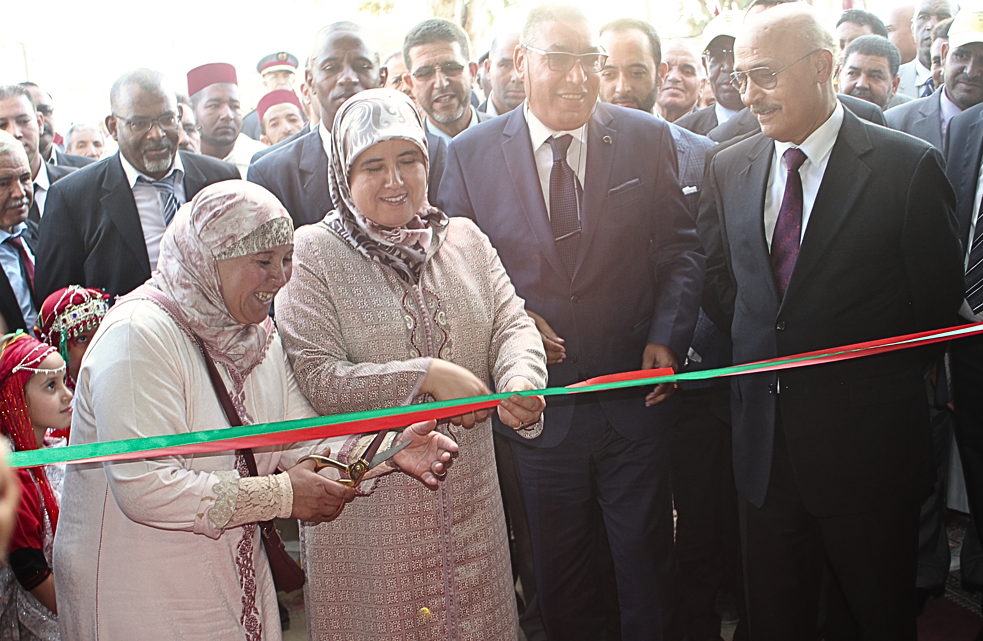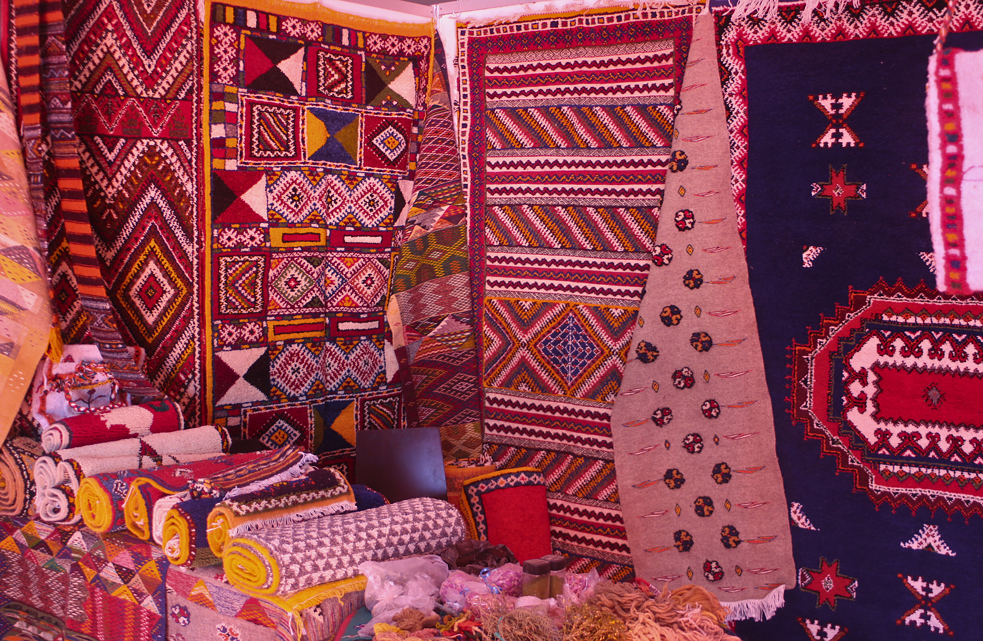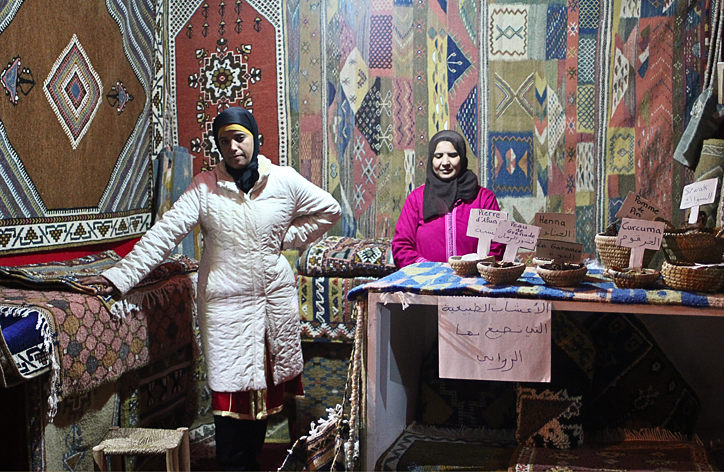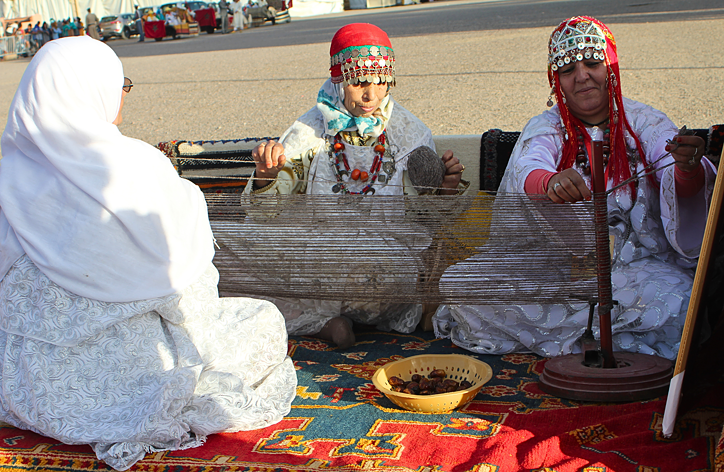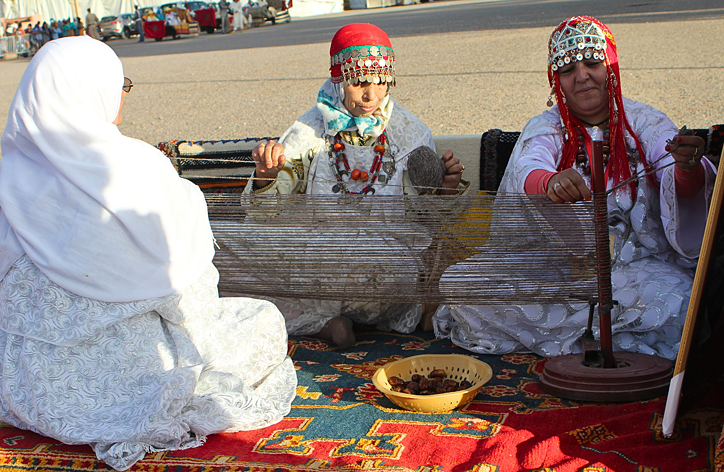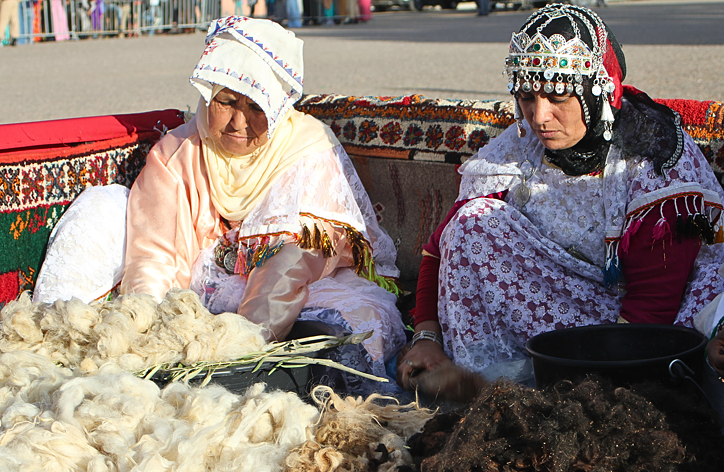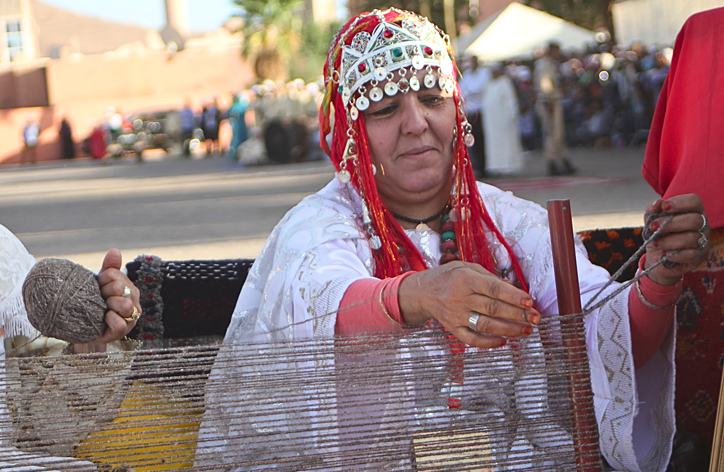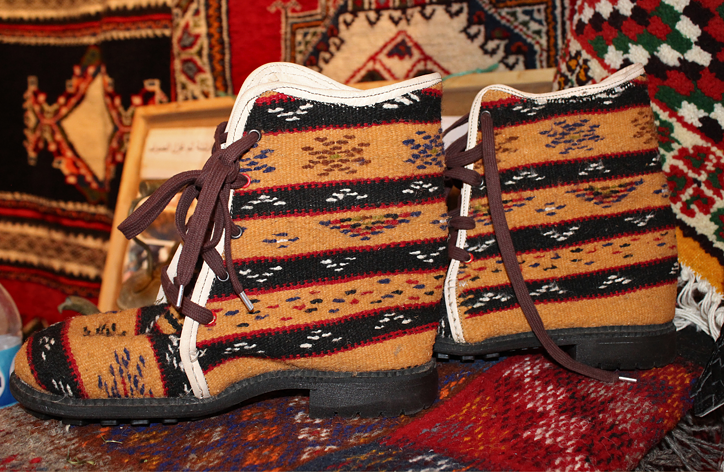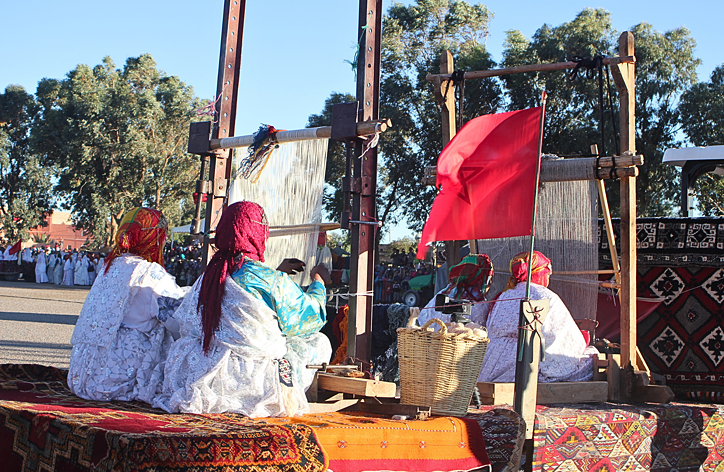The town of Tazenakht in southwestern Morocco has long been famed for its “Ouazguiti” carpets, named after the Ait Ouazguit, an Amazigh (Berber) tribe from the foothills of the High Atlas Mountains.
Visitors to the town, in the province of Ouarzazate, quickly notice the many associations and cooperatives dedicated to the production of Zarabi (traditional Moroccan carpets). Local women also put great creative energy into crafting beautiful carpets to decorate their own houses.Some 22,000 women work as weavers here, one of the main carpet-producing regions of North Africa. Their creations are a valuable part of Morocco’s cultural and historical heritage, and are highly prized both at home and overseas. The carpet industry makes an important contribution to many families’ incomes, helping to generate wealth, supporting women’s social advancement and integrating them into a system of sustainable development.
Environmentally Friendly Carpets
Ouazguiti carpets are made using traditional, environmentally friendly methods. Weavers and women’s cooperatives have also diversified into making other products such as light bags from wool, cloth, or recycled clothes, particularly after the Moroccan government banned plastic bags in 2015. This environmentally friendly alternative has been a commercial success.Craftswomen here also rely on locally sourced raw materials such as Sirwa wool, a high-quality material supplied by nomads who herd their sheep in the Sirwa area of the Atlas Mountains. To dye the wool, the weavers use herbs gathered in the nearby mountains, shunning synthetic chemicals and raising the quality of the rugs and their popularity with customers.
Carpets Generate Income and Support Sustainable Development
In an exhibition hall at the Ouazguit carpet festival, women weavers in traditional Amazigh dress from the region recite Amazigh poems, songs and stories. Some spin wool and weave carpets, demonstrating the various stages of carpet making and celebrating the craft, which is integral to the region’s heritage and identity.Yaja, in her forties, says that carpet weaving is accompanied by practices and rituals passed down through the generations. She never attended school and does not know how to read or write. Her mother taught her carpet weaving, which is her only profession but one she has mastered with great pride. After she was married, she taught it to her own daughters. Yaja says she is proud to weave carpets, but she worries that prices are falling and demand is weak even as the costs of production and raw materials remain high.
These pioneering craftswomen have colorful stories. Many have managed to overcome the restrictions and customs of their traditional society, not only excelling in their field but also having an impact through associations and even in politics. One of the most prominent examples is Safia Minoutras. Like most of the weavers in Tazenakht, she has been involved in carpet weaving since early childhood. She began working with Non-Governmental Organizations (NGOs) work two decades ago, when she helped establish the Dar El Oumouma (“Maternity Home”) association. Dar El Oumouma empowers women in the region through awareness-raising campaigns and tours by association members to remote towns, where most women only speak Amazigh and illiteracy is widespread.
Through this platform, Minoutras has done much to educate women about preventing disease and improving pre- and post-natal care. Thanks to her mastery of the Amazigh language and her detailed knowledge of women’s conditions in the region, she is a skilled communicator. She has been able to change certain behaviors, for example persuading women of the importance of visiting a doctor and monitoring their pregnancies. Women in this region suffer poverty and lack of resources, and the society is highly patriarchal, so Minoutras advises them to put aside money from their carpet sales to cover the expenses of children’s schooling and medical treatment.
Despite the hard work women put into making high-quality carpets, they are often deprived of the benefits of their work, as their husbands or fathers are responsible for selling the products. Moreover, the market is controlled by the middlemen, who pay prices well below the true value of the carpet and the labor involved. Women are now starting to think about how to overcome these barriers to the market.
Minoutras, through her work with associations, has had opportunities to build relationships with other groups and organizations, generating orders for carpets which are custom-made as gifts to certain specifications - inscribed with the names of people, institutions and companies, or with specific shapes and motifs.
Her work with Dar El Oumouma also inspired her to set up a carpet-making cooperative carpets in the Aznaguen community.
Weavers as Pillars of Sustainable Development
With the proceeds from their carpets, women weavers make a significant contribution to household incomes, adding to that of their husbands and paying for expenses such as school supplies and transportation fees for their children.The Aznaguen Rug Cooperative, headed by Minoutras, has adopted a new strategy enabling it to establish relationships with trading hubs both in Morocco and overseas, ultimately establishing permanent clients. This has helped overcome market barriers and bypass the middlemen. The women involved also take part in exhibitions within the region, in Moroccan cities beyond and even at international exhibitions. This is unprecedented for the region, and many weavers and cooperatives nearby are working to emulate it.
Women weavers and carpet-weaving cooperatives have demonstrated their importance as a pillar of sustainable development, playing an active role in Tazenakht’s economic and social development. Manoutras, who is also a member of the Drâa-Tafilalet Chamber of Traditional Industry, says the carpet industry employs more than 20 thousand women weavers, making it a vital hub of carpet production in North Africa generally.
Carpet-weaving is an economic activity with particularly low start-up costs, as it depends largely on the skills of women and girls using locally sourced raw materials, and on cooperation between the women of each village. Small operations then develop into larger cooperatives that adopt more modern marketing and management techniques. The resulting revenues play an important role in paying for schooling, providing medical care to family members and meeting their other needs, as well as funding development projects to meet the needs of the community more generally. Women have played a major economic and social role and increasingly take part in political decision-making, making the carpet industry vital to the region’s development.
Pioneers in Public Affairs
Women first took part in Moroccan elections on a large scale in 2009, after political parties allocated women’s quotas to ensure that 12 percent of seats were filled by female members. This was in line with the state’s drive to bring women into political life and increase their presence on elected councils.This prompted Morocco’s political parties to seek out prominent women and ask them to join their electoral lists as a way to win voters’ confidence. This led to Minoutras’ first experience of politics. Building on the reputation she had gained through her work with local associations, she won a seat on the Tazanakht municipal council. Later, she ran separately from the women’s quota, on an individual ballot and openly competing with other candidates. She was twice elected to the Drâa-Tafilalet Chamber of Traditional Industry, in 2015 and 2021, and was elected as a member of the Aznaguen Community Council in 2021.
However, Minoutras believes that despite the developing role of women in the region, their growing presence outside the home, relationships with people and institutions, and contributions to public affairs, patriarchal culture still prevails in the region. Women are not able to take their decisions independently. Rather, their fathers, husbands or brothers can choose who they will vote for and how to spend the income from carpets that women took great pains to weave.
Minoutras says women face huge challenges and constraints in confronting this patriarchal culture and need to step up their efforts to highlight their abilities and excel in their craft at the same time as advocating vigorously for more trust from their community.
She herself has shown that men and youth support her in elections to local councils and professional chambers, as do women who are allowed to make independent decisions and who value the contribution, role and abilities of women in politics.
Minoutras adds that the carpet industry has contributed not only to greater development but also to growing awareness of the need for equality between men and women in the region. It has also contributed greatly to Amazigh women’s ability to pioneer and shine.
Government Initiatives to Support Carpet Weavers
In February, Morocco’s Minister of Tourism, Handicrafts, Social and Solidarity Economy Fatima Zahraa Ammor wrote a response to a question by MP Hussein Bouhasini regarding the Moroccan government’s strategy to support women weavers and traditional artisans in Ouarzazate Province. The Minister confirmed that the province receives special attention within the ministry’s development programs. The ministry is working to rehabilitate the traditional crafts sector and highlight its position as a driver of sustainable development and an major generator of employment - especially the textile industry, which constitutes the most important source of jobs for women in the region.Ammor added that her ministry is working with partner institutions to implement several support programs, particularly encouraging both artisans in the region, both male and female, to integrate into the formal sector so they can benefit from programs provided by the state, notably in healthcare. The ministry is also working to revive a traditional industry complex in Tazanakht, allocating 30 production sites to cooperatives involved in carpet weaving and other traditional crafts. The ministry is also working to set up and equip two workshops for the production of Ouazguiti carpets in the villages of Asserssa and Serwa.
To take on growing competition, particularly from overseas, and tackle the problem of forgeries and cheap imitations of these products, the ministry is also working to establish a Protected Designation of Origin (PDO) certification for the carpets of the High Atlas and Tazanakht.
Innovation and Creativity Adding Value to Carpets
Dr. Omar Benaini, a professor of management at the National School of Business and Management in Settat, told Roya that despite their skillful work, women weavers often struggle to access the benefits of the post-production stages of the carpet industry such as marketing, promotion and distribution. Intermediaries, including individuals and companies who purchase carpets, take a significant portion of the profits from product sales. Benaini proposes that women weavers and cooperatives should organize their efforts through partnerships, integration and sharing added value with various actors in the sector, to supervise and help them promote their products, supply them with raw materials and create new carpet designs.Benaini says that to develop and encourage the sector, a production and marketing system should be created, part of a strategy for integrating traditional industries and the tourism sectors, to encourage cooperatives to market their products directly to Moroccan and foreign tourists.
November 2023
